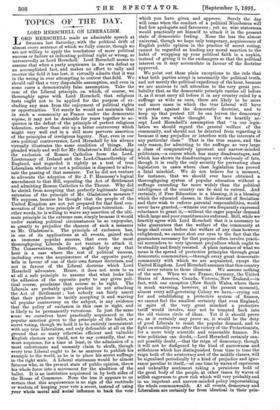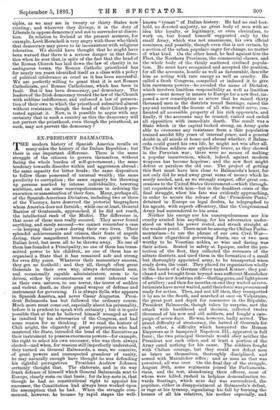TOPICS OF THE DAY.
LORD HERSCHELL ON LIBERALISM.
LORD HERSCHELL made an admirable speech at Swansea last Saturday, with the political drift of almost every sentence of which we fully concur, though we are not willing to apply the touchstone of mere political success or failure as indicating political right or wrong, so unreservedly as Lord Herschell. Lord Herschell seems to assume that when a party acquiesces in its own defeat as an accomplished fact, and makes no effort to rally and recover the field it has lost, it virtually admits that it was in the wrong in ever attempting to contest that field. We should call that a very disputable assumption, and even in some cases a demonstrably false assumption. Take the case of the Liberal principle, on which, of course, we thoroughly agree with Lord Herschell, that religious tests ought not to be applied for the purpose of ex- cluding any man from the enjoyment of political rights or opportunities. Yet surely he would not maintain that in such a community as France under the democratic regime, it may not be desirable for years together to ac- quiesce in the defeat of the principle of perfect religious toleration, rather than stir up a bitter controversy which might very well end in a still more perverse assertion of the principles of irreligious bigotry. Nay, even in our own political controversies, Lord Herschell by his silence virtually illustrates the same condition of things. He pleaded wisely and well for Mr. Gladstone's Bill abolishing the exclusion of Roman Catholics from the Lord- Lieutenancy of Ireland and the Lord-Chancellorship of England, and regarded it rightly as a test of true Liberalism whether or not a politician is disposed to advo- cate the passing of that measure. Yet he did not venture to advocate the adoption of Sir J. P. Hennessy's logical amendment to that Bill, repealing the Act of Settlement and admitting Roman Catholics to the Throne. Why did he shrink from accepting that perfectly legitimate logical extension of the principle of Mr. Gladstone's measure ? We suppose, because he thought that the people of the United Kingdom are not yet prepared for that final con- secration of the true principle of religious toleration. In other words, he is willing to waive any assertion of the ulti- mate principle in the extreme case, simply because it would under existing political circumstances be so unpopular, as greatly to prejudice the chances of such a measure as Mr. Gladstone's. The principle of exclusion has, in one of its applications at all events, gained such an immense popular success, that even the most thoroughgoing Liberals do not venture to attack it. The Conservatives, therefore, might fairly say that here is a case where the test of political success, including even the acquiescence of the opposite party, tells in favour of one of their own former doctrines, and not in favour of the Liberal doctrine which Lord Herschell advocates. Hence, it does not seem to us at all a safe principle to assume that what looks like the adhesion of the opposite party to any given poli- tical course, proclaims that course to be right. The Liberals are probably quite prudent in not attacking the Act of Settlement ; but nobody can fairly assert that their prudence in tacitly accepting it and waiving all popular controversy on the subject, is any evidence that the policy of exclusion in this case is right, and is likely to be permanently victorious. In just the same sense we ourselves have practically acquiesced in the popular sanction given to the principle of the ballot, or secret voting, though we hold it to be entirely inconsistent with any true Liberalism, and only defensible at all on the ground that so many otherwise efficient and valuable English electors are timid, not to say cowardly, that we must acquiesce, for a time at least, in the admission of a most unfortunate and unmanly claim to skulk, though every true Liberal ought to be as anxious to publish his example to the world, as he is to place his secret suffrage in the right scale. A Liberal statesman would be almost fatuous who, in the present state of public opinion, threw his whole force into a movement for the abolition of the ballot. It is an institution acquiesced in by both sides of the House of Commons. None the less it appears to us certain that this acquiescence is no sign of the rectitude or wisdom of keeping your vote a secret, instead of using your whole moral and social influence to back the vote which you have given and approve. Surely the day will come when the conduct of a political Nicodemus will find few apologists and favourers ; yet no wise statesman would practically set himself to attack it in the present state of democratic feeling. None the less the almost universal, though we hope only temporary, acquiescence of English public opinion in the practice of secret voting, cannot be regarded as lending any moral sanction to the habit of wrapping up your political faith in a napkin, instead of giving it to the exchangers so that the political interest on it may accumulate in favour of the doctrine approved.
We point out these plain exceptions to the rule that what both parties accept is necessarily the political truth, and not merely the political expediency of the hour, because we are anxious to call attention to the very great pro- bability that, as the democratic principle carries all before it, as it must carry all before it in any country ruled by a suffrage as wide as ours, there are likely to be more and more cases in which the true Liberal will have to protest against the democratic doctrine, and to keep up that protest till he can leaven the democracy with his own wider thought. Yet we heartily ac- cept Lord Herschell's assumption that " in our legis- lation we should regard the general welfare of the community, and should not be deterred from regarding it because it may prejudice or interfere with the interests of any particular class." That is the true reason, and the only reason, for admitting to the suffrage so very large a class of comparatively ignorant and narrow-minded politicians,—a course which has many disadvantages, and which has shown its disadvantages very obviously of late, though it is really the only security for preventing class legislation in cases where class legislation has proved a fatal mischief. We do not believe for 'a moment, for instance, that we should ever have obtained a thoroughgoing system of popular education without a suffrage extending far more widely than the political intelligence of the country can be said to extend. And certainly, if Free Education is a blessing, it is a blessing which the educated classes, in their distrust of Socialism and their wish to enforce parental responsibilities, would never have granted,—witness our own frequently expressed reluctance to grant it,—without the eager popular demand which large and poor constituencies enforced. Still, while we heartily agree with Lord Herschell that it is necessary to take guarantees that the welfare of the community at large shall count before the welfare of any class however enlightened, we cannot shut our eyes to the fact that the guarantees necessary for that purpose often involve practi- cal surrenders to very ignorant prejudices which ought to be steadily and firmly resisted. A plain instance of what we mean is the spread of protective principles through great democratic communities,—through every great democratic community with which we are acquainted, except the United Kingdom. Lord Herschell assumes that this country will never return to those illusions. We assume nothing of the sort. When we see France, Germany, the United States of America, Canada, Victoria, New Zealand,—in fact, with one exception (New South Wales, where there is much wavering, however, at the present moment), almost every self-governing Colony we have,—crying out for and establishing a protective system of finance, we cannot feel the smallest certainty that even England, in spite of the very great mischief a protective tariff would involve, may not be tempted back into the old vicious circle of ideas. Yet if it should prove so, as it certainly may prove so, it would be the duty of good Liberals to resist the popular demand, and to fight on steadily even after the victory of the Protectionists, for a more truly scientific and reasonable finance. No- wise politician can doubt,—Lord Herschell certainly can- not possibly doubt,—that the reign of democracy, though it will not be disfigured by the kind of narrowness and selfishness which has distinguished from time to time the reign both of the aristocracy and of the middle classes, will be signalised periodically by a kind of prejudice and igno- rance peculiar to itself,—at one time by waves of capricious and unhealthy sentiment taking a pernicious hold of the great body of the people, at other times by waves of selfish eagerness to grow rich which will very probably end. in an impotent and narrow-minded policy impoverishing the whole commonwealth. At all events, democracy and Liberalism are certainly far from identical in their prin- ciples, as we may see in twenty or , thirty States now existing ; and wherever they diverge, it is the duty of Liberals to oppose democracy and not to surrender at discre- tion. In relation to Ireland at the present moment, for example, Lord Herschel! is very angry with those who think that democracy may prove to be inconsistent with religious toleration. We should have thought that he might have been warned that there is a serious danger in that direc- tion when he sees that, in spite of the fact that the head of the Roman Church has laid down the law of charity in no ambiguous terms, the Roman Catholic priesthood has for nearly ten years identified itself as a class with a policy of political intolerance as cruel as it has been successful. We are perfectly willing to grant that it is not Roman Catholicism, qud Roman Catholicism, which has been in fault. But it has been democracy, quii, democracy. The leaders of the Irish democracy treated the law of the Church with sublime indifference, and enforced a law of persecu- tion of their own to which the priesthood submitted almost without resistance, though the head of their Church pro- tested against it. Now, is it possible to argue with any certainty that in such a country as this the democracy will not pervert the priesthood, even though the priesthood, as such, may not pervert the democracy ?



































 Previous page
Previous page